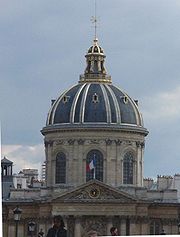
Institut de France
Encyclopedia


France
The French Republic , The French Republic , The French Republic , (commonly known as France , is a unitary semi-presidential republic in Western Europe with several overseas territories and islands located on other continents and in the Indian, Pacific, and Atlantic oceans. Metropolitan France...
learned society
Learned society
A learned society is an organization that exists to promote an academic discipline/profession, as well a group of disciplines. Membership may be open to all, may require possession of some qualification, or may be an honor conferred by election, as is the case with the oldest learned societies,...
, grouping five académies, the most famous of which is the Académie française
Académie française
L'Académie française , also called the French Academy, is the pre-eminent French learned body on matters pertaining to the French language. The Académie was officially established in 1635 by Cardinal Richelieu, the chief minister to King Louis XIII. Suppressed in 1793 during the French Revolution,...
.
The institute, located in Paris
Paris
Paris is the capital and largest city in France, situated on the river Seine, in northern France, at the heart of the Île-de-France region...
, manages approximately 1,000 foundations, as well as museum
Museum
A museum is an institution that cares for a collection of artifacts and other objects of scientific, artistic, cultural, or historical importance and makes them available for public viewing through exhibits that may be permanent or temporary. Most large museums are located in major cities...
s and chateau
Château
A château is a manor house or residence of the lord of the manor or a country house of nobility or gentry, with or without fortifications, originally—and still most frequently—in French-speaking regions...
x open for visit. It also awards prizes and subsidies, which amounted to a total of 5,028,190.55 euro
Euro
The euro is the official currency of the eurozone: 17 of the 27 member states of the European Union. It is also the currency used by the Institutions of the European Union. The eurozone consists of Austria, Belgium, Cyprus, Estonia, Finland, France, Germany, Greece, Ireland, Italy, Luxembourg,...
s for 2002. Most of these prizes are awarded by the Institute on the recommendation of the académies.
History
The Institut de France was created on 25 October 1795. It was created by former members of the Masonic lodge Les Neuf SœursLes Neuf Sœurs
Loge Les Neuf Sœurs , established in Paris in 1776, was a prominent French Masonic Lodge of the Grand Orient de France that was influential in organising French support for the American Revolution. A "Société des Neuf Sœurs," a charitable society that surveyed academic curricula, had been active at...
.
Académies

- Académie françaiseAcadémie françaiseL'Académie française , also called the French Academy, is the pre-eminent French learned body on matters pertaining to the French language. The Académie was officially established in 1635 by Cardinal Richelieu, the chief minister to King Louis XIII. Suppressed in 1793 during the French Revolution,...
(French Academy, concerning the French language) - founded in 1635 - Académie des inscriptions et belles-lettresAcadémie des Inscriptions et Belles-LettresThe Académie des Inscriptions et Belles-Lettres is a French learned society devoted to the humanities, founded in February 1663 as one of the five academies of the Institut de France.-History:...
(Academy of Humanities) - founded in 1663 - Académie des sciences (Academy of Sciences) - founded in 1666
- Académie des beaux-artsAcadémie des beaux-artsThe Académie des Beaux-Arts is a French learned society. It is one of the five academies of the Institut de France.It was created in 1795 as the merger of the:* Académie de peinture et de sculpture...
(Academy of Fine Arts) - created in 1816 as the merger of the Académie de peinture et de sculptureAcadémie de peinture et de sculptureThe Académie royale de peinture et de sculpture , Paris, was founded in 1648, modelled on Italian examples, such as the Accademia di San Luca in Rome. Paris already had the Académie de Saint-Luc, which was a city artist guild like any other Guild of Saint Luke...
(Academy of Painting and Sculpture, founded 1648), the Académie de musique (Academy of Music, founded in 1669) and the Académie d'architectureAcadémie d'architectureThe Académie royale d'architecture was a French learned society founded on December 30, 1671 by Louis XIV, king of France under the impulsion of Jean-Baptiste Colbert...
(Academy of Architecture, founded in 1671) - Académie des sciences morales et politiques (Academy of Moral and Political Sciences) - founded in 1795, suppressed in 1803, reestablished in 1832
Influence
The Royal Society of CanadaRoyal Society of Canada
The Royal Society of Canada , may also operate under the more descriptive name RSC: The Academies of Arts, Humanities and Sciences of Canada , is the oldest association of scientists and scholars in Canada...
, founded in 1882, was modeled after the Institut de France and the Royal Society
Royal Society
The Royal Society of London for Improving Natural Knowledge, known simply as the Royal Society, is a learned society for science, and is possibly the oldest such society in existence. Founded in November 1660, it was granted a Royal Charter by King Charles II as the "Royal Society of London"...
of London
London
London is the capital city of :England and the :United Kingdom, the largest metropolitan area in the United Kingdom, and the largest urban zone in the European Union by most measures. Located on the River Thames, London has been a major settlement for two millennia, its history going back to its...
.

